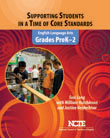Companion Resources for Supporting Students in a Time of Core Standards: English Language Arts, Grades PreK-2
 This site offers companion materials for the book Supporting Students in a Time of Core Standards: English Language Arts, Grades PreK-2 by Susi Long with William Hutchinson and Justine Neiderhiser. (Click here to purchase a copy.)
This site offers companion materials for the book Supporting Students in a Time of Core Standards: English Language Arts, Grades PreK-2 by Susi Long with William Hutchinson and Justine Neiderhiser. (Click here to purchase a copy.)
Resources include:
- links to the Common Core State Standards (CCSS) website, as well as to other standards-related sites
- links to NCTE position statements, guidelines, and publications
General Standards-related Resources
Updates on CCSS assessments from the Partnership for Assessment of Readiness for College and Careers (PARCC)and the SMARTER Balanced Assessment Consortium
Visit the Teaching and Learning Forum in the NCTE Connected Community to discuss the CCSS with other teachers and to share your experiences.
Visit ReadWriteThink.org for free lesson plans, student interactives, parent and afterschool resources, and more!
Appendix B: NCTE Principles
NCTE Principles Regarding Teachers as Decision-Makers
Features of Literacy Programs: A Decision-Making Matrix (NCTE Commission on Reading, 2005) PDF
Resolution on Scripted Curricula (2008)
Resolution on Affirming the Role of Teachers and Students in Developing Curriculum (2010)
NCTE Principles Regarding Reading Instruction
On Reading, Learning to Read, and Effective Reading Instruction: An Overview of What We Know and How We Know It (NCTE Commission on Reading)
NCTE Principles Regarding the Teaching of Writing
NCTE Beliefs about the Teaching of Writing (Writing Study Group of the NCTE Executive Committee, 2004)
NCTE Principles Regarding Teaching English Language Learners
NCTE Position Paper on the Role of English Teachers in Educating English Language Learners (ELLs) (NCTE ELL Task Force, 2006)
NCTE Principles Regarding 21st Century Literacies
21st Century Curriculum and Assessment Framework (2008)
NCTE Principles Regarding Assessment
Standards for the Assessment of Reading and Writing, Revised Edition (Joint IRA-NCTE Task Force on Assessment, 2009)
